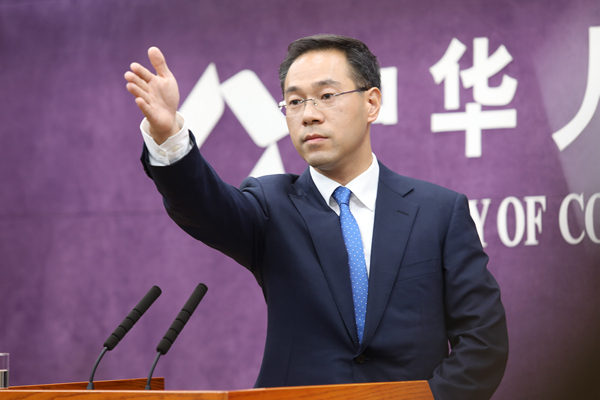


Spokesman for the Chinese Ministry of Commerce Gao Feng at a regular press briefing in Beijing on Thursday, June 21, 2018 [Photo: mofcom.gov.cn]
The United States' capricious way of policymaking and swinging "big sticks" at negotiations will do no good in solving problems, and China has to take strong countermeasures, the Ministry of Commerce said on Thursday.
Gao Feng, spokesman for the ministry, said the two sides had achieved positive outcomes in the agriculture and energy sectors during previous talks both in Washington in May and in Beijing early this month.
"The two sides had agreed to have another round of talks on manufacturing and service sectors and hold a detailed discussion on the structural issues in the following days," Gao said.
"However, we are deeply sorry that the US has been acting unpredictably with its policy-making and has triggered a trade war."
Gao said despite the positive outcomes of earlier talks, China is being forced to respond in a strong manner.
"The US is accustomed to negotiating with others while holding 'big sticks'," Gao said. "But it does not work with China, and such irrational behavior will do no good in solving any issue."
To counter the Trump administration's threats to slap a 10 percent tariff on $200 billion of Chinese products — in addition to issuing a tariff list for $50 billion Chinese goods — China fired back by being preparing "qualitative and quantitative" countermeasures after introducing tariffs on the same amount of US goods, $50 billion, the Ministry of Commerce said on Tuesday.
That amount includes automobiles, even though China had announced lower duties on imported vehicles of an average of 13.8 percent last month.
"Lowering import tariffs is a practical measure for China to further open up," Gao said. "It is a decision we take reluctantly to impose additional tariffs on imported vehicles from the US, but we have to do it to respond to the US tariff hike."
Gao said the US always blames other countries for its own inner structural problems, and accuses China of forcing technology transfers and stealing intellectual property, which is a serious distortion of the facts.
"Someone accused the Chinese government of forcing foreign companies to transfer their technology, but I have never heard of such actions," said Wu Song, general manager of the product and distribution department for the Asia-Pacific of Johnson Controls, a US industrial conglomerate.
Economists said the US global trade deficit started to balloon several years before China's surplus surged.
They said that suggests the cause of the imbalance lies somewhere other than with China.
Trump's thinking on trade is largely misguided, Yukon Huang, a senior fellow in the Asia program at the Carnegie Endowment for International Peace, told The Associated Press.
"The reason we have a trade war is that the fundamental assumptions that ... are totally wrong," Huang.
Huang added that such assumptions included the idea that the trade deficit is a problem and that there's too much US investment in China, when in fact there's too little.
The trade surplus China has with the US was caused by the country's role as the final assembly point in the industrial chain for components imported from neighboring economies, said Liang Ming, director of the institute of international trade at the Chinese Academy of International Trade and Economic Cooperation in Beijing.
Imposing new tariffs on Chinese goods is only an excuse for the US government to irrationally pursue political goals, as it has placed heavy restrictions on high-tech exports to China, said Lyu Xiang, a researcher at the Institute of World Economics and Politics of the Chinese Academy of Social Sciences.
He said the trade deficit issue will disappear automatically or drop significantly if the US traded with China in high-tech products, including aircraft engines.
 Fire brigade in Shanghai holds group wedding
Fire brigade in Shanghai holds group wedding Tourists enjoy ice sculptures in Datan Town, north China
Tourists enjoy ice sculptures in Datan Town, north China Sunset scenery of Dayan Pagoda in Xi'an
Sunset scenery of Dayan Pagoda in Xi'an Tourists have fun at scenic spot in Nanlong Town, NW China
Tourists have fun at scenic spot in Nanlong Town, NW China Harbin attracts tourists by making best use of ice in winter
Harbin attracts tourists by making best use of ice in winter In pics: FIS Alpine Ski Women's World Cup Slalom
In pics: FIS Alpine Ski Women's World Cup Slalom Black-necked cranes rest at reservoir in Lhunzhub County, Lhasa
Black-necked cranes rest at reservoir in Lhunzhub County, Lhasa China's FAST telescope will be available to foreign scientists in April
China's FAST telescope will be available to foreign scientists in April "She power" plays indispensable role in poverty alleviation
"She power" plays indispensable role in poverty alleviation Top 10 world news events of People's Daily in 2020
Top 10 world news events of People's Daily in 2020 Top 10 China news events of People's Daily in 2020
Top 10 China news events of People's Daily in 2020 Top 10 media buzzwords of 2020
Top 10 media buzzwords of 2020 Year-ender:10 major tourism stories of 2020
Year-ender:10 major tourism stories of 2020 No interference in Venezuelan issues
No interference in Venezuelan issues
 Biz prepares for trade spat
Biz prepares for trade spat
 Broadcasting Continent
Broadcasting Continent Australia wins Chinese CEOs as US loses
Australia wins Chinese CEOs as US loses